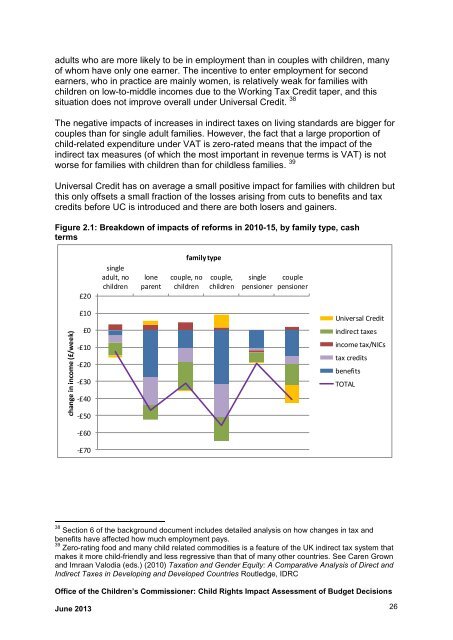force_download.php?fp=/client_assets/cp/publication/676/A_Child_Rights_Impact_Assessment_of_Budget_Decisions
force_download.php?fp=/client_assets/cp/publication/676/A_Child_Rights_Impact_Assessment_of_Budget_Decisions
force_download.php?fp=/client_assets/cp/publication/676/A_Child_Rights_Impact_Assessment_of_Budget_Decisions
You also want an ePaper? Increase the reach of your titles
YUMPU automatically turns print PDFs into web optimized ePapers that Google loves.
change in income (£/week)<br />
adults who are more likely to be in employment than in couples with children, many<br />
<strong>of</strong> whom have only one earner. The incentive to enter employment for second<br />
earners, who in practice are mainly women, is relatively weak for families with<br />
children on low-to-middle incomes due to the Working Tax Credit taper, and this<br />
situation does not improve overall under Universal Credit. 38<br />
The negative impacts <strong>of</strong> increases in indirect taxes on living standards are bigger for<br />
couples than for single adult families. However, the fact that a large proportion <strong>of</strong><br />
child-related expenditure under VAT is zero-rated means that the impact <strong>of</strong> the<br />
indirect tax measures (<strong>of</strong> which the most important in revenue terms is VAT) is not<br />
worse for families with children than for childless families. 39<br />
Universal Credit has on average a small positive impact for families with children but<br />
this only <strong>of</strong>fsets a small fraction <strong>of</strong> the losses arising from cuts to benefits and tax<br />
credits before UC is introduced and there are both losers and gainers.<br />
Figure 2.1: Breakdown <strong>of</strong> impacts <strong>of</strong> reforms in 2010-15, by family type, cash<br />
terms<br />
£20<br />
single<br />
adult, no<br />
children<br />
lone<br />
parent<br />
family type<br />
couple, no<br />
children<br />
couple,<br />
children<br />
single<br />
pensioner<br />
couple<br />
pensioner<br />
£10<br />
£0<br />
-£10<br />
-£20<br />
-£30<br />
-£40<br />
Universal Credit<br />
indirect taxes<br />
income tax/NICs<br />
tax credits<br />
benefits<br />
TOTAL<br />
-£50<br />
-£60<br />
-£70<br />
38 Section 6 <strong>of</strong> the background document includes detailed analysis on how changes in tax and<br />
benefits have affected how much employment pays.<br />
39 Zero-rating food and many child related commodities is a feature <strong>of</strong> the UK indirect tax system that<br />
makes it more child-friendly and less regressive than that <strong>of</strong> many other countries. See Caren Grown<br />
and Imraan Valodia (eds.) (2010) Taxation and Gender Equity: A Comparative Analysis <strong>of</strong> Direct and<br />
Indirect Taxes in Developing and Developed Countries Routledge, IDRC<br />
Office <strong>of</strong> the <strong>Child</strong>ren’s Commissioner: <strong>Child</strong> <strong>Rights</strong> <strong>Impact</strong> <strong>Assessment</strong> <strong>of</strong> <strong>Budget</strong> <strong>Decisions</strong><br />
June 2013 26



